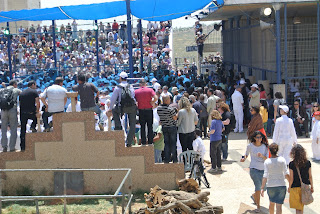Ramallah in the West Bank
This past weekend around 16 of us went to Nablus in the northern part of the West Bank to watch the Samaritan sacrifice, which marks the beginning of their Passover. Samaritanism is similar to Judaism, but claims that it is the true ancient Israelite religion from before the Babylonian exile. There are currently only 745 left in the world, who live in two communities within Israel. One of which is on Mount Gerizim, in Nablus, where we visited. We traveled across the Green Line into Ramallah and then took a 45 minute cab to Nablus, where we took another cab up the steep mountain.
The mountaintop was bustling with tourists, journalists, and Israeli soliders. Our group made it there within 30 seconds of the ceremony starting, and a few of us managed to get through the gate onto to the platform where the ceremony was taking place. All the men were dressed in white jumpsuits and wearing rain boots, which I assumed was because of the blood. There were around 50 families in the community and each one was to slaughter and eat a lamb. When we arrived the men had the lambs between their legs and were holding knives, preparing for the slaughter. The entire community was chanting while everyone watched, and the atmosphere seemed to be of anticipation and excitement. I was pretty nervous, having never seen an animal slaughtered before, and was conflicted between wanting to look and run away all at the same time. The men began to lay down the lambs, who quickly figured out was happening and started to struggle. Once they were all secured, the chanting stopped and the throats were slit. I couldn't see directly, but knew it had happened because there was a loud cheer and everyone began hugging and kissing one another. They also started smearing the blood on each other's heads, which was a little startling at first. The lambs were bleeding out, and many of them were still struggling, but after a few minutes you could only see their labored breathing and finally they died--taken out of their misery.
Then the butchering and the skinning began, which was also very interesting. Small children just wander around as this was happening right on the ground in front of them. There was a lot of blood covering everyone, but they didn't seem phased. Some children prepared the fires for the animals to be cooked, while others watched their parent prepare the animals. The lambs were skinned, which were then brought to the side of the pits to be burned, and then gutted and put on a stake. This whole process took around 20 minutes, but the people seemed very comfortable and the men adept.
Although it was surprising to see that so many tourists, journalists, and even Israeli officials were allowed to attend a religious ceremony, it was nice to witness such a joyous family affair. The community is obviously tight-knit, and the members seem to be too involved in their celebration to mind the apparent intrusion. It was also interesting to see such an intersection of cultures, which of course occurs with really any gathering in the region of Israel and the West Bank. Between the Samaritans, the Israeli soliders defending them, the international tourists, and both Israeli and Arab spectators, it was quite a melting pot. And although I don't think I will ever eat lamb, I really enjoyed learning about and witnessing a culture I hardly knew existed.
|























No comments:
Post a Comment